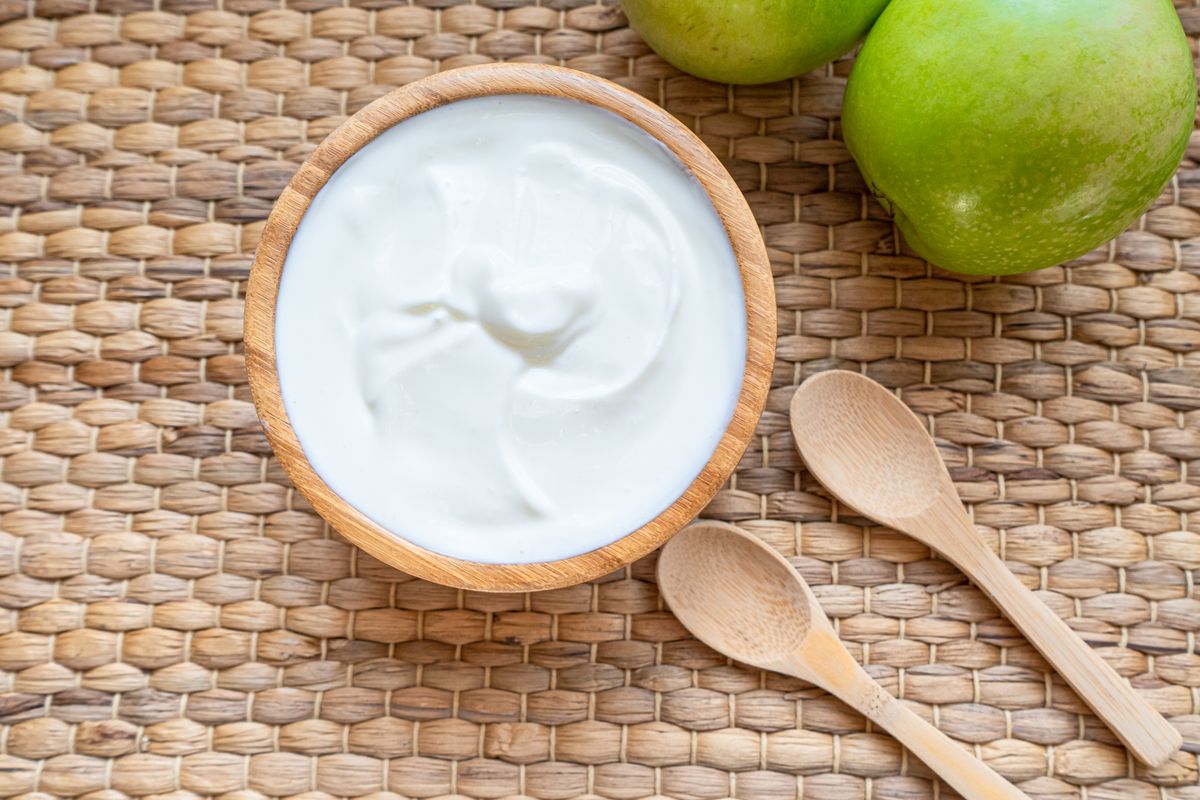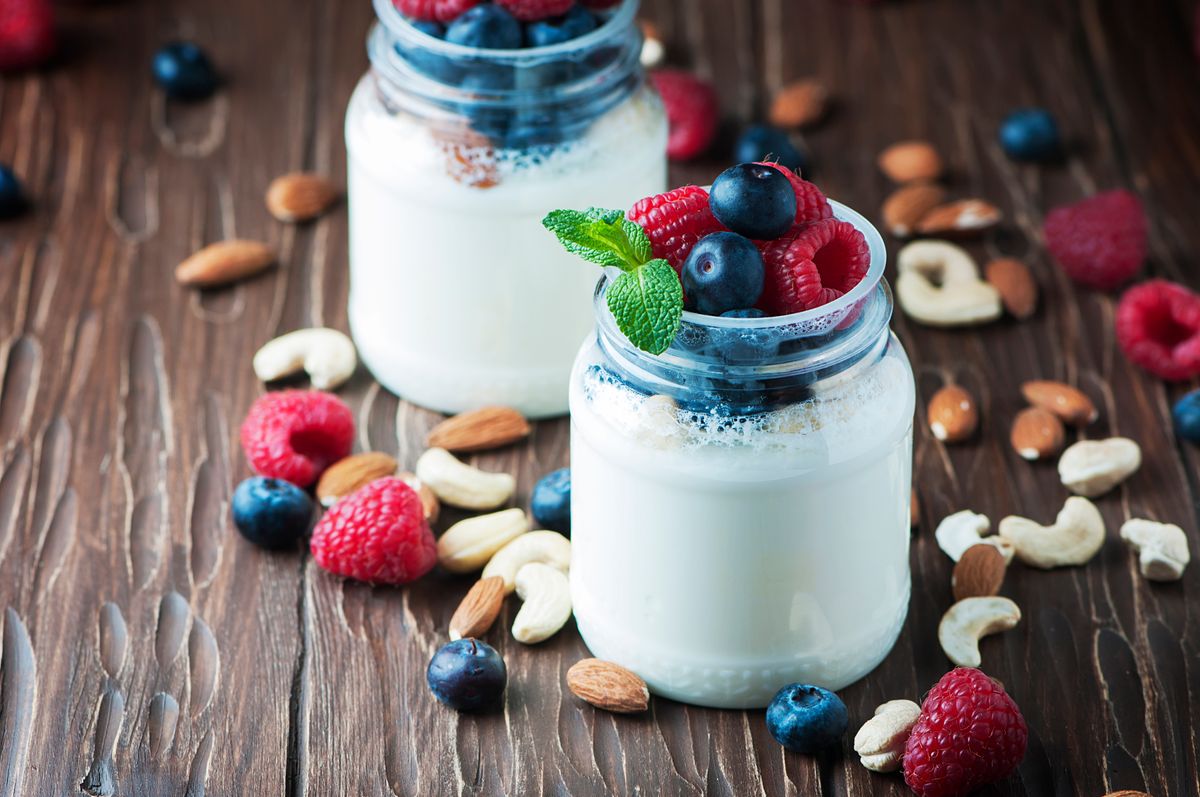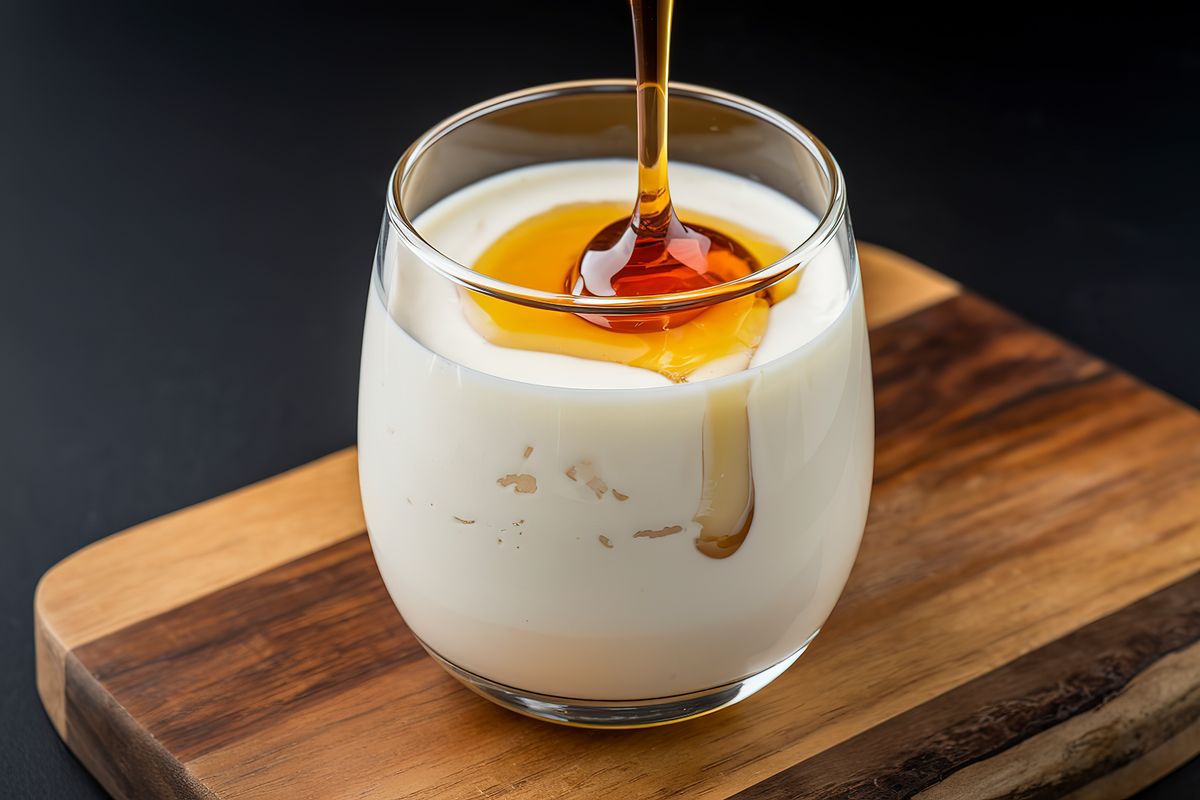In recent years, fermented foods have gained prominence thanks to their numerous health benefits. Among them, yogurt has become one of the most popular, especially for its ability to improve gut health, strengthen immunity, and support muscle development. This food stands out due to its high content of quality proteins, natural probiotics, and essential nutrients that nurture your body daily. But what makes yogurt so special? Why is it a great addition to your diet for improving body composition and boosting your microbiota? We’ll tell you everything you need to know about this essential food.
Lactobacillus delbrueckii subsp. bulgaricus and Streptococcus thermophilus are two types of bacteria that ferment milk to make yogurt.
What is yogurt?
Dietitian Sergio Guerrero, a collaborator with Fit Generation, notes that yogurt traces its roots to the Balkans and Middle East. Its health benefits are well-documented in scientific research. Yogurt is made by fermenting milk with two key bacteria: Lactobacillus delbrueckii subsp. bulgaricus and Streptococcus thermophilus. These bacteria work together to break down lactose into lactic acid, thickening the milk and giving yogurt its tangy taste (Tamime & Robinson, 2007).
Science-backed perks of yogurt, straight from the experts
- Bone health: Yogurt is a solid source of calcium, crucial for building and maintaining strong bones. When it’s fortified with vitamin D, it becomes even more effective—vitamin D boosts calcium absorption, making it easier for your body to put that mineral to work. This combo helps lower the risk of bone loss and conditions like osteoporosis, especially during menopause and later in life.
- Metabolism and body weight: Epidemiological studies show that regular yogurt consumption supports healthy body weight. Its protein, probiotics, and nutrients help boost metabolism, improve satiety, and may lower the risk of obesity and metabolic syndrome—especially when part of a balanced lifestyle.
- Reduced risk of chronic diseases: Studies link regular yogurt consumption to a lower risk of chronic diseases. Its probiotics, calcium, and protein content are tied to reduced chances of high blood pressure, heart disease, and type 2 diabetes.
Yogurt: A protein powerhouse for your muscles
Want to stay strong as you age? Yogurt can help. It’s not just a snack—it’s a reliable source of high-quality protein, especially the thick varieties like Greek yogurt or skyr. These deliver all the essential amino acids your body needs to build, repair, and maintain muscle.
That’s why it’s a go-to for athletes, active adults, and anyone focused on aging well. It supports muscle growth, aids recovery, and helps you feel full. Most importantly, it protects muscle mass over time—key for staying mobile and independent.
Yogurt’s muscle magic: Protein-packed and senior-friendly
Just 100 grams of Greek yogurt packs up to 10 grams of protein—rich in essential amino acids, especially leucine, which triggers muscle growth. Research shows that 2–3 grams of leucine per meal can support muscle building, and yogurt helps you hit that target.
Add in calcium, and you’ve got a strong recovery combo. It helps reduce post-workout fatigue and lowers injury risk. For active seniors or anyone looking to maintain strength, yogurt is an easy, effective way to support muscle health.
Yogurt does wonders beyond taste—it’s a quiet hero for your insides. It strengthens your gut’s defenses, calms inflammation, and gives your immune system a gentle boost. For seniors looking to feel their best, it’s a simple, delicious way to keep everything running smoothly.
Why Yogurt loves your gut (and you’ll love It too)
Yogurt isn’t just good for bones and muscles—it supports gut health, too. As a fermented food, it delivers live cultures that help balance your gut microbiota, the bacteria that aid digestion, support immunity, and even influence mood.
Nutrition professor Andrea Calderón puts it simply: “The magic of fermented foods lies in their power to restore and balance your gut microbiota.” Yogurt helps by strengthening the gut barrier, reducing inflammation, and giving your immune system a boost.
Yogurt’s benefits go beyond digestion. Regular intake is linked to lower risks of obesity, type 2 diabetes, and heart disease. New studies also suggest a gut-brain connection—showing that a healthy microbiota may support mood and mental clarity.
Struggling with sleep? Yogurt contains tryptophan, which helps produce serotonin—key for relaxation and better rest.
For older adults, it’s a simple, nourishing way to support both body and mind.
Yogurt: Science says yes, social media says too much
Yogurt’s benefits are real—solid science supports them. But scroll through social media, and the hype can sometimes outpace reality. Indeed, the health benefits of this creamy staple are genuine, yet some positive posts may distort the truth more than a yoga pose. For seniors trying to sort fact from fluff, take comfort: the real, research-backed perks of yogurt are impressive enough on their own—no need for exaggeration.
Yogurt’s great, But it’s no miracle cure
Yogurt—especially the thick, creamy Greek variety—is definitely having its time in the spotlight. It’s nutritious, flexible in the kitchen, and, let’s face it, pretty tasty. But it’s not a miracle food. As nutrition expert Andrea Calderón puts it plainly, “Superfoods? They’re a myth.”
Despite the wellness trends that have turned yogurt and other fermented foods into stars, Calderón reminds us that the science, while supportive, is often overshadowed by social media exaggeration.
For seniors, it's important to understand that while yogurt can be a great addition to your diet, it shouldn't replace medical advice or solve complex health issues. The key? Pair it with a balanced diet and a smart lifestyle—because even the best yogurt can’t do it all alone.
Beware: Not all yogurts are created equal
Seniors, be aware that not all "yogurt" is truly nutritious. Look for at least 3% protein and 3% fat in full-fat versions. Many store-bought brands are just imitations—loaded with thickeners, sugars, and barely any live cultures. These additives cut down the benefits. Check the label and skip the fakes. Your gut deserves better.
The 3-4-3 rule for healthy yogurt
Want a yogurt that’s truly good for you? Look for the magic numbers: 3-4-3. That’s at least 3% protein, no more than 4% sugars, and 3% fat in its full-fat version. It’s a simple guide to spot the real winners on the shelf—ones that deliver nutrition without overloading on sweetness. If you're a senior who wants to maintain a healthy diet, this simple guide can help you choose yogurt that is both nutritious and delicious.
Homemade vs. Store-bought yogurt: Which wins?
DIY fermented foods like homemade yogurt are trending—but is it worth the effort? Nutrition professor Andrea Calderón puts it in perspective: “Homemade has its charm, but commercial yogurt offers consistency and precision in the types and amounts of beneficial bacteria.”
Making yogurt at home is simple: heat milk to 85°C, cool it to 45°C, stir in a plain yogurt starter, and let it sit at 40–45°C for 6–12 hours. Once thickened, refrigerate it. You’re in control—but results can vary, especially with probiotic content and texture.
Store-bought yogurt, on the other hand, is consistent, safe, and ideal for seniors or anyone with a sensitive immune system. Homemade can be fun—but if you want reliability, the commercial version wins on peace of mind.
References
Astrup, A. (2014). Yogurt and dairy product consumption to prevent cardiometabolic diseases: Epidemiologic and experimental studies. The American Journal of Clinical Nutrition, 99(5), 1235S–1242S. https://doi.org/10.3945/ajcn.113.073015
Marco, M. L., Heeney, D., Binda, S., Cifelli, C. J., Cotter, P. D., Foligné, B., Gänzle, M., Kort, R., Pasin, G., Pihlanto, A., Smid, E. J., & Hutkins, R. (2017). Health benefits of fermented foods: Microbiota and beyond. Current Opinion in Biotechnology, 44, 94–102. https://doi.org/10.1016/j.copbio.2016.11.010
Marette, A., Picard-Deland, É., & Fernandez, M. A. (2017). Yogurt: Roles in nutrition and impacts on health (1st ed.). CRC Press. https://doi.org/10.1201/b21826
Rizzoli, R., Biver, E., Bonjour, J. P., et al. (2018). Benefits and safety of dietary protein for bone health— An expert consensus paper endorsed by the European Society for Clinical and Economic Aspects of Osteoporosis, Osteoarthritis, and Musculoskeletal Diseases and by the International Osteoporosis Foundation. Osteoporosis International, 29(9), 1933–1948. https://doi.org/10.1007/s00198-018-4534-5
,type=downsize)













